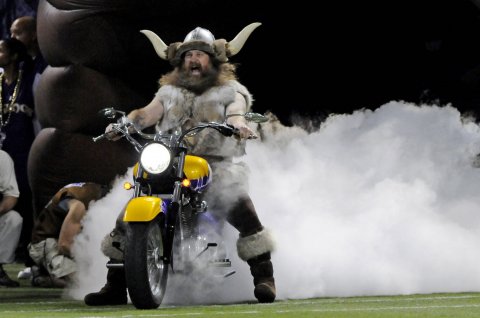Should you ask for a 1200% raise?
Hey it's October! The best month of the year by far. If you don't believe me, check out Months, ranked and get up to speed.
So happy October.
Hey question for you career-minded folks or for those of you who might sit on the other side of the compensation table, making decisions about comp offers, raises, and bonuses for your teams.
Should you (or anyone) ever have the gumption to ask for a 1200% raise?
Sounds kind of ridiculous in the land of 3% annual salary increases, (maybe 4% if you are a 'top performer'), and with organizations continuing to do everything they can to resist the inevitable upward pressure on wages that an improving economy with falling unemployment will drive.
But 1200% of a pop? You would have to be really confident to make that kind of a salary demand.
Why is that particular figure on my mind?
From reading recent piece on Business Insider, Vikings part ways with their mascot after he demanded a 1200% raise.
From the piece:
Ragnar, the Vikings' unofficial mascot, and his motorcycle have been a fixture at Minnesota Vikings games for over two decades, but that appears to be over as the two sides have been unable to reach an agreement on a new contract.
Ragnar, whose real name is Joe Juranitch, was seeking a new contract that would pay him $20,000 per game, according to Michael Rand of the Star Tribune. That would translate to an annual salary of $200,000 for eight regular season and two preseason games, and an increase of more than 1,200% from his previous pay of "about $1,500 per game" last season.
I have never been to a Vikings home game, so I am really not too sure what exactly Ragnar brought to the table, and particularly what he thought would be worth about $5,000/hour (game lasts about 3 hours, add 1 hour for pre and post game work). But it is pretty clear from the way the Vikings basically responded to this demand with a 'Thanks Ragnar, it's been really nice working with you. Good luck!' that Ragnar had severely overestimated his value and his leverage.
What can us normals take away from this little viking adventure, even if we are just trying to secure a reasonable bump, say 10% or so?
1. Have some idea of how much actual value, (revenue, increased customer retention, tangible cost savings, etc.), we are directly responsible for creating.
2. Have some idea how painful it would be to the company if we actually walked out when our crazy demands were not met.
3. Have some idea of the market more generally for folks who do what we do.
Our pal Ragnar pretty much failed on all accounts. He likely did not generate any appreciable revenue for the team. Even though his Facebook page was full of comments from fans expressing support and anger towards the team, it would take an enormous stretch of believability to conclude that any actual fans would refuse to attend games due to his absence.
He also didn't really grasp that the games would carry on pretty much unaffected once he was no longer a part of the show. The team preparation certainly would not be affected. His absence actually would create less work not more for the game day operations staff. In fact, other than the small number of fans who missed his performance at the game, everyone else lives got a little bit easier.
Finally, there is almost no chance that Ragnar surveyed the landscape of professional sports mascots to come up with market comparables that led him to make a $20K per game demand. If team mascots were really pulling down anywhere near that kind of scratch, there would be line hundreds of people long to try out for those gigs. More than likely, one of Ragnar's buddies got into his head that he was somehow underpaid and under appreciated, (and that he was WAY more important to the product than he was).
Look, I get wanting to make every last dollar you can. We are probably all underpaid for the amount of crap we have to put up with. But the key question is knowing just how much you are really underpaid, and making sure you are honest about your value, how replaceable you are, and your ego.
Happy October.
 Career,
Career,  sports tagged
sports tagged  8 Man Rotation,
8 Man Rotation,  HR,
HR,  career,
career,  compensation,
compensation,  negotiation,
negotiation,  rewards
rewards  Email Article
Email Article 
 Print Article
Print Article 
Reader Comments